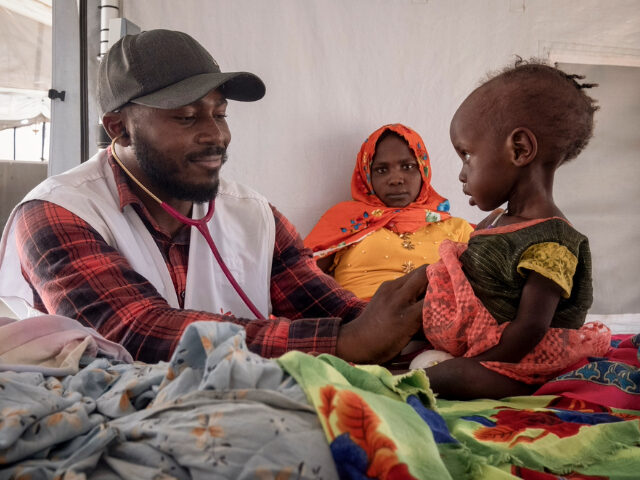The death toll in Sudan’s conflict regions continues to rise as civilians are blocked from receiving food and medical equipment by feuding junta forces, who have now been at war with each other for more than a year.
Sudan’s fractured military government is not keeping good records of the dead and dying, so Reuters, on Thursday, looked at handwritten lists of fatalities and satellite photos of rapidly swelling graveyards to get a sense of the death toll:
One cemetery on the southern edge of Kalma has expanded 2.5 times faster in the first half of 2024 than it did in the second half of 2023, a Reuters analysis of satellite images shows.
Graveyards are fast expanding elsewhere in the Darfur region, which has been ravaged by the war between the Sudanese military and the paramilitary Rapid Support Forces (RSF) that has engulfed the country. In the teeming Zamzam displaced persons camp, now home to hundreds of thousands of people, a cemetery on that facility’s southern edge expanded about three times faster in the first half of 2024 than in the second half of last year.
In all, Reuters identified 14 burial grounds in five communities across Darfur that have expanded rapidly in recent months. The area of new graves at these burial grounds has grown up to three times faster in the first half of 2024 than in the second half of last year. That increase, moreover, came on top of an already-high base: The region saw weeks of violence in the last six months of 2023 that resulted in many deaths.
Even these grim clues did not capture the full extent of suffering from the Sudanese civil war, as malnutrition and disease are spreading rapidly across the country, leaving a trail of skeletal men, women, and children. International humanitarian groups now consider roughly 20 percent of the population to be in an “emergency food situation or worse.” A comparable portion of the populace has been displaced from its homes.
One of the warring parties, the RSF militia, has a habit of raiding warehouses full of humanitarian aid and looting hardscrabble farmers to feed its fighters. Its opponents in the Sudanese army are little better, cruelly blocking supply lines to starve out RSF militants — and every innocent civilian around them. Each faction insists on its innocence and blames the other for committing crimes against humanity. Humanitarian groups say both factions make it unsafe for them to deliver aid to villagers.
These tactics have contributed to an almost 80-percent reduction in food production and shuttered 80 percent of Sudan’s medical facilities. The civilian population has resorted to eating dirt and practicing witchcraft to cure diseases. The harvest season is over, and the rainy season has begun, so those desperate souls will soon be eating mud.
“Malnutrition and disease reinforce each other, with sick children becoming more easily malnourished and malnourished children becoming sick more easily. Sudan risks a lost generation,” the U.N. warned in May.
Doctors Without Borders (known by its French acronym MSF) said in June that more than 50 Sudanese villages have been wiped out by man-made fires, especially in the Darfur region, where the RSF militia is apparently using scorched-earth tactics to drive out the forces of junta commander Gen. Abdel Fattah al-Burhan. Videos posted on the Telegram messaging platform showed RSF fighters dancing and celebrating as raging fires consumed civilian houses around the city of El Fasher, where al-Burhan’s forces are encamped.
MSF doctors said El Fasher is almost completely cut off from food and medicine. One of the city’s few hospitals was shut down after RSF militants looted it for supplies and stole one of its ambulances.
Analysts told Voice of America News (VOA) on Friday that the Sudan civil war has been prolonged by heavy foreign funding of both factions.
Hala al-Karib, regional director for the Strategic Initiative for Women, told VOA that Iran and Egypt are supporting al-Burhan’s army, while the RSF is getting heavy support from the United Arab Emirates (UAE) and Russia’s infamous Wagner Group, a mercenary outfit that has been largely absorbed into President Vladimir Putin’s war machine after the highly suspicious death of its founder, Yevgeny Prigozhin.
Senior lecturer Kwaku Nuamah of American University’s School of International Services said Iran has gone from neutrality in the Sudanese conflict to active support for al-Burhan due to its “need for allies as it faces crushing global sanctions.”
The Emirati government told VOA it denies allegations of meddling in the Sudan civil war, and some analysts said it was very difficult to determine who was involved due to the general chaos of the situation. However, the BBC found evidence that al-Burhan’s army used Iranian-made drones to capture state broadcast headquarters in Khartoum from the RSF. Iranian cargo planes large enough to carry a hefty supply of drones have mysteriously appeared at airports controlled by the Sudanese army.
The RSF has its own drone fleet, largely composed of the same drone models that have been supplied by the UAE to allied forces in Ethiopia and Yemen. As with the Iranian link to al-Burhan’s forces, Emirati planes have mysteriously appeared at airports controlled by the RSF. The UAE insists these planes were delivering humanitarian aid.
All of these drone shipments, if confirmed, would be violations of a 2005 U.N. Security Council resolution that banned supplying weapons to the Sudanese government or any armed faction in the Darfur region.

COMMENTS
Please let us know if you're having issues with commenting.